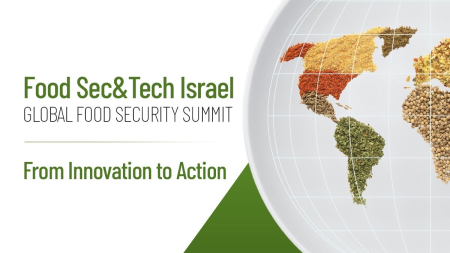FSTI: Battling Food Insecurity

In June, I had the good fortune of being invited to the 2023 Food Sec&Tech Israel summit (FSTI). Over 400 multidisciplinary food industry professionals (many by invitation) met for one day in Tel Aviv to address the global issue of food security. Attendees spent the next two days in the Galilee region inaugurating the Israel National Food Innovation Center at Tel Hai Academic College.
When providing the keynote address the opening morning, I recalled meeting Dr. Erel Margalit when he was a Knesset labor party member. He spent time with me and PeakBridge’s Nadav Berger to discuss his plan to create the Israeli Food Valley with the innovation center as part of its anchor. Margalit left parliament and returned to the venture firm he founded, Jerusalem Venture Partners. His activities and investments since executed his vision we discussed in his office six years prior.
FSTI Summit Takeaways
- Not enough global legislative and regulatory attention to food security exists
- Food security is, and will be, very dependent upon food manufacturing infrastructure, especially at pilot scale
- Food insecurity increased globally during and since COVID
- Four pillars must be considered for national food security – domestic production, imports, storage, and strategic placement of food technology assets
- New Epoch Capital Founder Victor Friedberg described “food as the fulcrum of the future” and predicted we will see a focus on “conscious consumer growth”
- Agricultural science is focusing on food security through crop improvement for better nutrient absorption, concentrated efforts on production with sustainability in mind, and partnership with food manufacturers on the food and health connection through artificial intelligence, CRISPR, biologicals, and other agricultural technologies
- Although the United States, Israel, and Singapore are considered important innovation centers, Mexico City, Stockholm, and Nairobi are a few of the new emerging geographies to watch
Battling Food Insecurity
The summit helped me consider how society can help battle the war on food insecurity:
- Focus on the key issues. It seems silly to say this, but the massive transformation that needs to happen in agriculture, food processing, consumer behavior, and cultural changes will require multiple generations. How does one eat the elephant? One bite at a time! We cannot wait for a one-piece mentality. We must attack from multiple angles. The critical factor for the future will be which pieces to start with in this quest.
- Governments and private equity need to be deployed for scale-up and manufacturing capabilities. This will also necessitate novel financial models. For example, the World Bank and United Nations have recommended that projects proposed for financing be prioritized to organizations and companies that meet five critical criteria:
- Reshape public support and incentives;
- Integrate health, environmental and social risks into financial decision-making;
- Scale fit-for-purpose financial products and business models;
- Secure equitable food systems; and
- Strengthen food governance and sustainability. Being successful with these criteria requires coordination of policies and the alignment of interests across scales and governments.
- Everyone must believe in using technology to solve problems. There should not be geopolitical squabbling about using or not using various technologies like there has been for genetic modification. We should not be delusionary about fixing these problems without modern technologies and other tools. The only way to move forward will be continued funding for innovation.
It is better to be proactive than wait for a tragedy to occur and then try to figure out what happened. We have been doing this on too many fronts for several years. It’s time to act.
- Categories: